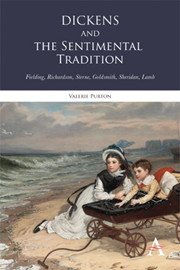Book contents
- Frontmatter
- Contents
- Acknowledgements
- A Note on the Text
- Introduction
- Chapter 1 Dickens and the Sentimentalist Tradition
- Chapter 2 Sentimentalism and its Discontents in the Eighteenth-Century Novel: Fielding, Richardson and Sterne
- Chapter 3 Sentimentalism and its Discontents in Eighteenth-Century Drama: Goldsmith and Sheridan
- Chapter 4 Dickens and Nineteenth-Century Drama
- Chapter 5 The Early Novels and The Vicar of Wakefield
- Chapter 6 The Later Novels
- Conclusion The Afterlife of Sentimentalism
- Notes
- Bibliography
- Index
Chapter 6 - The Later Novels
Published online by Cambridge University Press: 05 November 2012
- Frontmatter
- Contents
- Acknowledgements
- A Note on the Text
- Introduction
- Chapter 1 Dickens and the Sentimentalist Tradition
- Chapter 2 Sentimentalism and its Discontents in the Eighteenth-Century Novel: Fielding, Richardson and Sterne
- Chapter 3 Sentimentalism and its Discontents in Eighteenth-Century Drama: Goldsmith and Sheridan
- Chapter 4 Dickens and Nineteenth-Century Drama
- Chapter 5 The Early Novels and The Vicar of Wakefield
- Chapter 6 The Later Novels
- Conclusion The Afterlife of Sentimentalism
- Notes
- Bibliography
- Index
Summary
‘What the Waves were always saying’
The sentimental bond between Dickens and his implied (and actual) readership provides the real emotional heart of each of the great novels. It involves, as I shall argue in this chapter, several key aspects of the nineteenth-century sentimentalist tradition, including its evolution from eighteenth-century moralising to individual emotional sympathy, and its confusion between the theatrical and public on the one hand and the Romantic and private on the other. The unique closeness of Dickens and his readers is so generally accepted (even by critics who object to it) that I feel obliged to include Virginia Woolf 's perverse comment to prove my point through the blatant inappropriateness of hers:
Of all the great writers Dickens is both the least personally charming and the least personally present in his books. No-one has ever loved Dickens as he loves Shakespeare or Scott.
Robert Garis provides one example of a much more common response:
I have phrased my answer to Dickens's dilemma in direct discourse because one tends to feel a warm personal attachment to the manager of the Dickens theatre.
Benjamin Jowett, who delivered the sermon at Dickens's funeral service, expressed the same sense of attachment on behalf of the first generation of Dickens's readers:
[N]o-one was ever so much beloved or so much mourned. Men seem to have lost, not a great writer only, but one whom they had personally known.
- Type
- Chapter
- Information
- Dickens and the Sentimental TraditionFielding, Richardson, Sterne, Goldsmith, Sheridan, Lamb, pp. 121 - 150Publisher: Anthem PressPrint publication year: 2012



